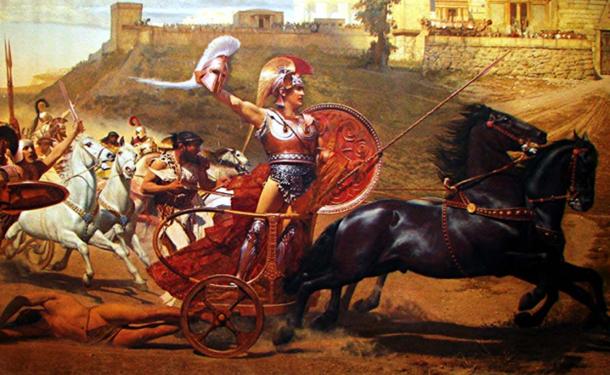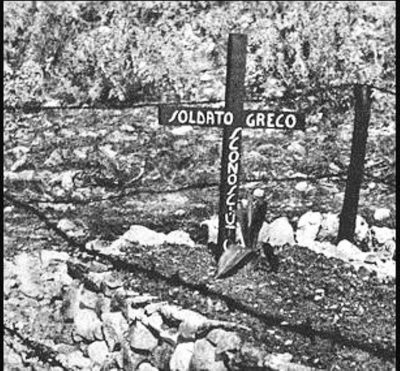Sing, Goddess, Achilles’ rage,
Black and murderous, that cost the Greeks
Incalculable pain, pitched countless souls
Of heroes into Hades’ dark,
And left their bodies to rot as feasts
For dogs and birds, as Zeus’ will was done.
-Homer, Iliad, Book I
What was the Greek perception of the warrior Achilles? Was he truly a hero for the Geeks, worthy of emulation and ever lasting praise? Or is Achilles and the cultural story of the Iliad a warning against anger, vanity, lust, and excessive pride?
And by "hero," I do unapologetically use the modern term; a person who is "admired for achievement and noble qualities" and not just someone of divine origin endowed with superhuman strength or ability.
Put more simply, was Achilles (focusing mostly on cultural perception) ever an idolized icon for the Ancient Greeks? Was he ever a role-model for Greek virtues & excellence, and did he receive hero-worship?
Some facts and arguments we should consider;
1.) Achilles was considered to have existed, along with the Trojan War. There was also a hero's cult of Achilles (which if proven to be extensive would settle this debate) along with a gravesite reportedly visited by Alexander.
2.) Achilles is also featured extensively in Greek poetry and art. Though this is not enough to prove a positive perception, it does prove renown and cultural significance.
3.) Hero-worship to the Greeks largely meant being invoked in sacrifices and rituals, where Pausanias does lend support (in his descriptions of 2nd century Greece) that Achilles was invoked in prayer by Elis women prior to the start of the Olympic Games. Achilles is also mentioned as a sanctuary hero for the cities of Pythia (Achilles's home city), Sparta, and several island cities along the coasts of Asia Minor and The Black Sea. Achilles again (according to descriptions like Pausanias), is mostly honored in these cities for athletic achievement.
4.) Hero cults in Ancient Greece (prior to Alexander) can best be characterized as a highly evolved transformation of the worship of ancestors, within the social context of the polis. This is an extremely important point. Most Greek heroes and gods were not celebrated in the same light beyond their patron cities, and it was a rare occurrence for a Greek hero then to have the same celebrity status in Sparta as he would in Athens.
Rare exceptions include:
-Oracle at Delphi
-Myth of the Trojan War
-Olympic Games
-The Odyssey and Iliad.
- The Greek Pantheon (12 original Olympians).
5.) Homer -it can be argued- takes a decidedly negative view of Achilles in the Iliad & Odyssey, along with the warrior class. The biggest strikes against Achilles of course are the rejections of Arete and Kleos (warrior virtue, trophies & fame) that Homer seems to suggest through the consequences of Achilles’s rage; leading to the deaths of Hector & Patroclus along with many Greeks at Troy. More so however, Achilles is described as vindictive, sadistic, cruel, and temperamental, a man of divine background, superhuman ability, with loyalties to no one but himself. To Greek honor codes that valued collective participation and relatableness to others, Achilles is markedly alone.
6.) Homer, interestingly enough, also takes on a negative view of Ares, the God of War. This is important because rather than praise the warrior class and warrior virtue (the supposed cultural embodiment of Ares & Achilles), Homer’s view of Ares (as Zeus’s least favorite son) sends an anti-war message.
7.) Homer -along many Greek writers- have traditionally not described a happy ending to the Trojan War, or a glorious aftermath for its survivors (such as Odysseus). And rather then reach the Elysian Fields (Greek version of Heaven), Homer implies that Achilles soul actually resides in Hades.
8.) Achilles -from what I’ve gathered- is not praised by Athenian philosophers, such as Plato. In Plato’s Republic, Plato criticizes Achilles attachment to Patroclus and overreaction to his death. He also criticizes Achilles for insubordination, impiety, and putting pride before the collective good.
9.) In Plato's Symposium, Socrates is described in a mirror as the reflection to Achilles. Rather than an identical reflection, Socrates represents a reverse of the original.
10.) Achilles was invoked in the opening lines of Simonides' elegy at Plataea. While this does prove Panhellenic appeal, it is unclear if Achilles was mentioned more to highlight Panhellenic virtues in battle or simply the contributions from Sparta (a warrior state).
11.) Neoptolemus was perhaps even more ruthless than Achilles. And despite being the son of the great warrior, he is killed after denouncing Apollo. Achilles, likewise, was also killed through acts of Apollo. Neither were perhaps favored by the Gods, but it is through Neoptolemus lineage that Alexander claimed ancestry to Achilles, and of course, political legitimacy in Greece.
Conclusions:
Achilles, as a traditional Greek Hero (demigod/superhero) had significant and rare Panhellenic appeal throughout all of Greece. His legacy is forever tied to the Trojan War and Homer’s Iliad, two of the most important cultural myths in Greek history (not to mention Western History). However, the appeal of Achilles as a paragon of Greek virtue and excellence, was limited to areas that valued a warrior class and bravery in battle (Thessaly & Sparta). To other Greek states and writers however, Achilles is more of a tragedy, or a warning against war and the ways individual glory and honor can do damage to the rest of society. This view of Achilles however, changes a little bit with the conquests of Alexander and the subsequent rise of military dictatorship.











 Reply With Quote
Reply With Quote

































